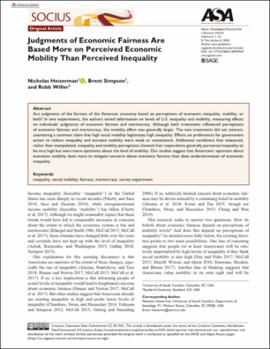| dc.contributor.author | Heiserman, Nicholas | |
| dc.contributor.author | Simpson, Brent | |
| dc.contributor.author | Willer, Robb | |
| dc.date.accessioned | 2023-10-12T14:41:39Z | |
| dc.date.available | 2023-10-12T14:41:39Z | |
| dc.date.issued | 2022-09-29 | |
| dc.identifier | oksd_heiserman_judgments_of_economic_fairness_2020 | |
| dc.identifier.citation | Heiserman, N., Simpson, B., Willer, R. (2020). Judgments of economic fairness are based more on perceived economic mobility than perceived inequality. Socius, 6, 2378023120959547-. https://doi.org/10.1177/2378023120959547 | |
| dc.identifier.issn | 2378-0231 | |
| dc.identifier.uri | https://hdl.handle.net/11244/339842 | |
| dc.description.abstract | Are judgments of the fairness of the American economy based on perceptions of economic inequality, mobility, or both? In two experiments, the authors varied information on levels of U.S. inequality and mobility, measuring effects on individuals’ judgments of economic fairness and meritocracy. Although both treatments influenced perceptions of economic fairness and meritocracy, the mobility effect was generally larger. The two treatments did not interact, countering a common claim that high social mobility legitimizes high inequality. Effects on preferences for government action to reduce inequality and increase mobility were weak or nonexistent. Additional conditions that measured, rather than manipulated, inequality and mobility perceptions showed that respondents generally perceived inequality to be very high but were more optimistic about the level of mobility. Our studies suggest that Americans’ optimism about economic mobility does more to mitigate concerns about economic fairness than does underestimation of economic inequality. | |
| dc.format | application/pdf | |
| dc.language | en_US | |
| dc.publisher | SAGE Publications | |
| dc.relation.ispartof | Socius, 6 | |
| dc.rights | This material has been previously published. In the Oklahoma State University Library's institutional repository this version is made available through the open access principles and the terms of agreement/consent between the author(s) and the publisher. The permission policy on the use, reproduction or distribution of the material falls under fair use for educational, scholarship, and research purposes. Contact Digital Resources and Discovery Services at lib-dls@okstate.edu or 405-744-9161 for further information. | |
| dc.title | Judgments of economic fairness are based more on perceived economic mobility than perceived inequality | |
| dc.date.updated | 2023-10-10T21:05:51Z | |
| dc.note | open access status: Gold OA | |
| osu.filename | oksd_heiserman_judgments_of_economic_fairness_2020.pdf | |
| dc.identifier.doi | 10.1177/2378023120959547 | |
| dc.description.department | Sociology | |
| dc.type.genre | Article | |
| dc.type.material | Text | |
| dc.subject.keywords | sociology | |
| dc.subject.keywords | human society | |
| dc.subject.keywords | basic behavioral and social science | |
| dc.subject.keywords | behavioral and social science | |
| dc.subject.keywords | reduced inequalities | |
| dc.identifier.author | ORCID: 0000-0002-4211-1767 (Heiserman, N) | |
| dc.identifier.author | ScopusID: 57195403081 (Heiserman, N) | |
| dc.identifier.author | ScopusID: 7102222039 (Simpson, B) | |
| dc.identifier.author | ScopusID: 16305967100 (Willer, R) | |
| dc.identifier.essn | 2378-0231 | |
